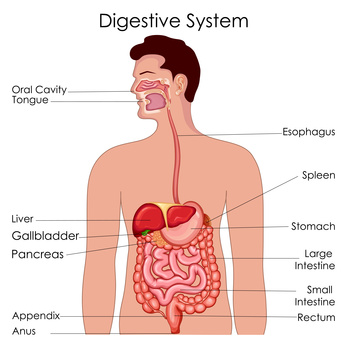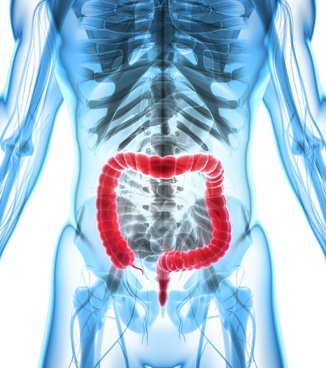Irritable Bowel Syndrome (IBS), Spastic Colon – Causes, Symptoms, Diet
What is IBS or Spastic Colon?
Irritable bowel syndrome (IBS) is a condition where there is abdominal pain with changes in bowel habit, such as diarrhea, constipation or an alternation of both. The diagnosis of irritable bowel syndrome is commonly made when these symptoms are present but only if other bowel diseases have been excluded as a possible cause. It is a functional bowel disorder meaning that there is no disease process despite the presence of these symptoms. Instead it is believed to be due to disturbances in normal bowel physiology.
What does spastic colon mean?
Spastic colon is an outdated term for irritable bowel syndrome (IBS). It originated as a means to describe the abdominal pain and cramps that are characteristic of irritable bowel syndrome. These cramps were believed to be due to spasms of the bowel wall muscles. Although the term spastic colon is still used occasionally, it technically refers to irritable bowel syndrome (IBS) and not other bowel conditions with similar symptoms.

Causes and Mechanism of IBS
The exact cause of IBS is not known. IBS tends to run in families so a genetic or social predisposition may exist. IBS may be triggered by psychological stress, certain foods, infection, major disease or bowel surgery but these triggers are not causes of the syndrome. Instead it appears to be due to an abnormality of gastrointestinal and specifically bowel (small and large intestines) physiology.
IBS is a syndrome and not a disease because there is no pathology that can be identified which may be responsible for the symptoms. One of the leading theories as to the mechanism of irritable bowel syndrome is that there is an abnormality in the nerve and/or muscle activity in the bowel wall. These muscles are responsible for moving through food, wastes and stool from the mouth to the anus.
It appears that in some people there is overactivity of these muscles, possibly originating from hyperstimulation by the nerves that innervate these muscles. This can then lead to irritable bowel syndrome with diarrhea (IBS-D). Conversely there may be underactivity of these nerves and muscles which then gives rise to irritable bowel syndrome with constipation (IBS-C).
The pain in IBS is believed to be due to spasms of the bowel wall muscles. This may occur in conjunction with increased sensitivity to sensations within the internal organs that are not normally perceived. It is referred to as visceral hyperalgesia. Other theories include microscopic inflammation, abnormalities in the normal intestinal flora (the natural microbes within the bowels) and even psychogenic factors.
Symptoms of IBS
Irritable bowel syndrome (IBS) tends to affect adolescents and adults but can occur in young children (as young as 6 years) and the elderly. It is important to note that the symptoms of IBS are similar to the symptoms of several other conditions, like inflammatory bowel disease (IBD). It is therefore important that a diagnosis of IBS is only reached once other conditions have been excluded. This often requires intensive diagnostic investigations.
Read more on IBS vs IBD.
The signs and symptoms of irritable bowel syndrome includes:
- Alternating diarrhea (loose bowel movements) and constipation, from which one can dominate
- Bloating and gas
- Painful abdominal cramps or urgency after the meal or stress event
- Symptoms are typically relieved by a bowel movement
- Mucus in the bowel movement
NOTE: There is no fever, bowel bleeding, persistent severe abdominal pain, or weight loss in IBS. If any of these symptoms appear, this is not IBS and other bowel disorders should be considered.
Rectal bleeding in people with irritable bowel syndrome can occur but is usually due to bleeding hemorrhoids as a result of the diarrhea or constipation. However, there is no bleeding from the lower bowel wall. Instead the bleeding is from the inflamed and engorged rectal veins that are referred to as hemorrhoids (piles).

Functional diarrhea, also called painless or nervous diarrhea, is similar to IBS but without abdominal pain. Irritable bowel syndrome (IBS) is also a functional bowel disorder but the characteristic feature is the abdominal pain and cramps with the alteration in bowel habit, giving rise to diarrhea or constipation.
Diagnosis of IBS
Diagnosis of IBS is made after exclusion of other diseases by physical examination, blood and stool tests, colonoscopy, upper endoscopy, and eventual x-ray of abdomen. Small intestinal bacterial overgrowth (SIBO), fructose malabsorption, lactose intolerance, and celiac disease, which may mimic IBS, should be excluded by investigations. Diagnosis of IBS may be given when no organic disease was found in a person with abdominal discomfort and changed bowel habit lasting at least 12 weeks in the last 12 months (2).
Diet in IBS
It is recommended to divide meals into small portions to reduce irritability of the food. There’s no rules which foods to eat, but lists of common foods to avoid in IBS exist. Some affected by IBS recommend starting a day with foods high in soluble fiber, like oat bran. Keeping a diary of ingested foods, drinks, medications and stressful events may help you find out what causes your symptoms.
IBS and Coping With Stress
Both excessive stress, or avoiding “due stress” may trigger IBS. Non-solved emotional issues can elevate the tone of autonomic nerves that innervate the bowel thus making it excessively irritable. Learning which work and relationships bring joy and peace in your life, accepting ones they do and refusing those they don’t may help you in coping with stress. Advice from a wise person you trust can also help a lot.
Is there a cure for IBS?
There is no cure for irritable bowel syndrome. Avoiding irritant foods and coping with stress is the approach to managing IBS. Antidepressant drugs, fiber supplements, antispasmodic drugs or anti-diarrheal drug loperamide are not effective therapy for IBS (3) but may be used for symptomatic relief. Ultimately the focus is on dietary and lifestyle management.
Read more on how to manage IBS with diet and lifestyle.
Prognosis of IBS
IBS tends to cease with age (it is rare after age of 40) and it does not develop into bowel inflammation or cancer. Nevertheless, irritable bowel syndrome can cause signfiicant discomfort and have an effect on the various spheres of a person’s life.
Last updated on September 8, 2018.



